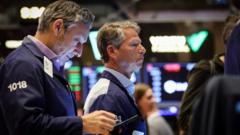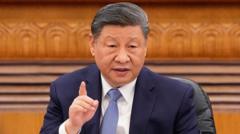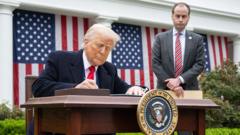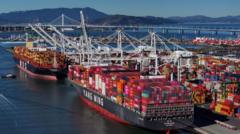President Trump's upcoming import tax announcements are stirring mixed responses in financial markets, raising concerns about a global trade war and its implications for economic stability.**
Uncertainty in Global Markets as Investors Anticipate Trump's Tariff Announcements**

Uncertainty in Global Markets as Investors Anticipate Trump's Tariff Announcements**
Shares rise slightly in the US while global markets react negatively to potential comprehensive tariffs from the President.**
As President Donald Trump prepares to unveil what he dubs "America's Liberation Day," global financial markets are experiencing mixed reactions amid heightened apprehensions over potential comprehensive tariffs. While US shares managed a slight recovery, stocks in Asia and Europe saw declines as investors braced for Trump's proposed import taxes that could affect nearly all countries.
Trump's rhetoric hints at a more extensive approach to tariffs, building on previous measures instituted against aliminum, steel, and automobiles, as well as increased levies on Chinese imports. Analysts are expressing concern over the potential fallout from a full-throttle trade war, which could adversely impact global economic conditions. With conflicting signals from Trump about the scope of tariffs—at times suggesting some countries might receive exemptions and other times leaning towards a broader implementation—markets are grappling with uncertainty.
In the UK, government officials have acknowledged that the country is likely to be impacted by US tariffs, hinting at possible retaliatory measures. Diplomats are engaged in ongoing discussions concerning an economic deal, but progress seems to be stalled ahead of the pivotal announcement. Meanwhile, the European Union and Canada are preparing their own responses to anticipated US trade actions.
Recent data reflect increased volatility: the S&P 500 has experienced a near 10% decline since mid-February, marking March as its poorest month in several years. Contrastingly, US stocks exhibited some resilience, with the Dow rising by 1% and the S&P closing up by 0.5%, even as the Nasdaq saw a minor drop.
Over in Asia, Japan's Nikkei 225 faced a severe hit, dropping over 4%, while South Korea's Kospi dropped 3%. The UK’s FTSE 100 index declined by nearly 0.9%, and both Germany's DAX and France’s CAC 40 also ended in the red. As financial markets react, gold prices surged to a record high, indicating a shift toward safer investments amid fears of economic instability.
Experts assert that persistent uncertainty regarding tariffs could linger, compounded by the potential for inflationary pressure should businesses pass additional costs onto consumers. Trump has positioned tariffs as a means to secure improved trade terms and bolster US job growth, with predictions claiming a 10% tariff could create around three million jobs.
However, organizations like Brompton Bicycle have raised concerns about the potential adverse effects of tariffs on competitiveness. CEO Will Butler-Adams mentioned that while his firm isn't currently facing higher taxes, future tariffs could necessitate a significant reevaluation of their market strategy and investment in the US.
Additionally, Trump indicated a September 5 deadline for TikTok’s Chinese owner, ByteDance, to find a non-Chinese buyer or risk facing a ban, illustrating the administration’s international financial maneuvers extending beyond traditional trade tariffs.
As global markets react to these developments, analysts and investors alike remain watchful for the impact of Trump's upcoming announcements on international trade dynamics.





















